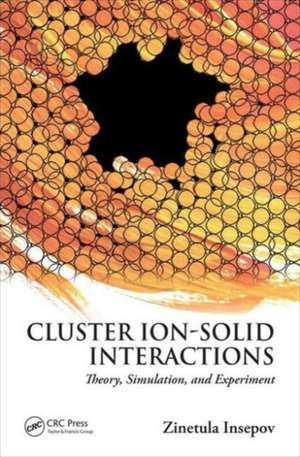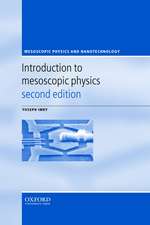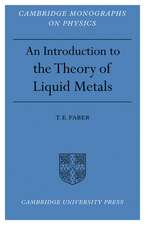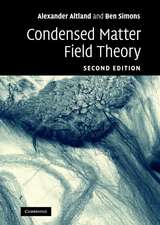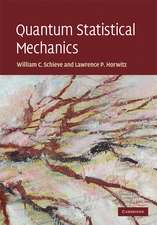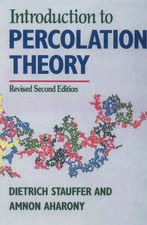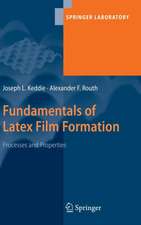Cluster Ion-Solid Interactions: Theory, Simulation, and Experiment
Autor Zinetula Insepoven Limba Engleză Hardback – apr 2016
The author introduces the basic principles of statistical physics and thermodynamics before covering applications, experimental justifications, and practical implementations. He describes classical nucleation theory and explains the drawbacks of this theory, showing how accurate modeling and simulations are necessary to justify theoretical approaches and simplifications.
| Toate formatele și edițiile | Preț | Express |
|---|---|---|
| Paperback (1) | 312.43 lei 6-8 săpt. | |
| CRC Press – 10 dec 2019 | 312.43 lei 6-8 săpt. | |
| Hardback (1) | 876.36 lei 6-8 săpt. | |
| CRC Press – apr 2016 | 876.36 lei 6-8 săpt. |
Preț: 876.36 lei
Preț vechi: 1178.59 lei
-26% Nou
Puncte Express: 1315
Preț estimativ în valută:
167.70€ • 175.31$ • 141.72£
167.70€ • 175.31$ • 141.72£
Carte tipărită la comandă
Livrare economică 06-20 martie
Preluare comenzi: 021 569.72.76
Specificații
ISBN-13: 9781439875421
ISBN-10: 1439875421
Pagini: 272
Ilustrații: 99 black & white illustrations, 7 black & white tables
Dimensiuni: 156 x 234 x 22 mm
Greutate: 0.5 kg
Ediția:1
Editura: CRC Press
Colecția Chapman and Hall/CRC
Locul publicării:Boca Raton, United States
ISBN-10: 1439875421
Pagini: 272
Ilustrații: 99 black & white illustrations, 7 black & white tables
Dimensiuni: 156 x 234 x 22 mm
Greutate: 0.5 kg
Ediția:1
Editura: CRC Press
Colecția Chapman and Hall/CRC
Locul publicării:Boca Raton, United States
Cuprins
Introduction. Molecular Models of Cluster Formation. Molecular Dynamics Method. Kinetics of Cluster Formation in Dense Gases. Kinetics of Cluster Formation on Surfaces. Cluster Formation Kinetics in Thin Film Growth. Multiscale Concept for Condensation in Rarefied Gases. Nucleation and Condensation in Gases. Introduction to Advanced Surface Modification with Gas Cluster Ion Beams. Crater Formation by Gas Cluster Ion Beam Impact. Index.
Notă biografică
Zinetula Insepov is an adjunct professor in the School of Nuclear Engineering at Purdue University and a professor in the Department of Condensed Matter Physics at the Moscow Engineering Physics Institute (MEPhI). He is the chief scientist and head of the Nanosynergy Laboratory at Nazarbayev University. Dr. Insepov is also a founding faculty fellow of the Skolkovo Institute of Science and Technology (Skoltech)/Massachusetts Institute of Technology (MIT) initiative. He has previously held positions at Albert Ludwig University of Freiburg, Kyoto University, Epion Japan, and Argonne National Laboratory. His research focuses on the fundamental physics of ion beam materials processing, including very-low-energy ion–solid interactions. He developed cluster ion beam interaction simulation programs based on molecular dynamics and Monte Carlo methods. He also predicted a new lateral sputtering phenomenon that is a driving force behind the efficient atomistic smoothening mechanism of surfaces irradiated by large gas cluster ions. Recently, he predicted a nanopumping effect and is developing a new device that allows pump gases and liquids via nanometer-scale channels.
Recenzii
"This book fulfills a great need in the growing field of cluster ion physics, giving a timely overview of the theory, simulation, and experimental methods. I highly recommend it to students, instructors, and practitioners in the field."
—Genri E. Norman, Dr. Habilitus, Joint Institute for High Temperatures of Russian Academy of Sciences, Moscow Institute of Physics and Technology (State University)
"Professor Insepov’s theoretical insights and modeling have illuminated, visualized, predicted, and guided research in the field for many years, and this book will be a key resource for understanding complex phenomena such as the lateral sputtering effect of high velocity clusters impacting on surfaces."
—Dr. David R. Swenson, Principal Scientist, Passport Systems, Inc.
"This book is an enthusiastic presentation of fundamental physical principles and mathematical tools lying behind the new cluster ion beam technology … The book explains the basic principles and fundamentals of cluster nucleation, formation, and growth in various media, including adsorption layers on the surfaces, in rarefied and dense gases, as well as on various applications of cluster ion beams for surface cleaning and etching and implantation. By explaining the process, it builds a bridge between the fundamental concepts of thermodynamics and physical kinetics with the new physical and engineering cluster applications. … I believe that the author can be confident that there will be many grateful readers who will gain a broader perspective of the disciplines of cluster science and applications as a result of his efforts."
—From the Foreword by Ahmed Hassanein, Paul L. Wattelet Distinguished Professor and Head of Nuclear Engineering, Purdue University
—Genri E. Norman, Dr. Habilitus, Joint Institute for High Temperatures of Russian Academy of Sciences, Moscow Institute of Physics and Technology (State University)
"Professor Insepov’s theoretical insights and modeling have illuminated, visualized, predicted, and guided research in the field for many years, and this book will be a key resource for understanding complex phenomena such as the lateral sputtering effect of high velocity clusters impacting on surfaces."
—Dr. David R. Swenson, Principal Scientist, Passport Systems, Inc.
"This book is an enthusiastic presentation of fundamental physical principles and mathematical tools lying behind the new cluster ion beam technology … The book explains the basic principles and fundamentals of cluster nucleation, formation, and growth in various media, including adsorption layers on the surfaces, in rarefied and dense gases, as well as on various applications of cluster ion beams for surface cleaning and etching and implantation. By explaining the process, it builds a bridge between the fundamental concepts of thermodynamics and physical kinetics with the new physical and engineering cluster applications. … I believe that the author can be confident that there will be many grateful readers who will gain a broader perspective of the disciplines of cluster science and applications as a result of his efforts."
—From the Foreword by Ahmed Hassanein, Paul L. Wattelet Distinguished Professor and Head of Nuclear Engineering, Purdue University
Descriere
This book provides an overview of various concepts in cluster physics and related topics in physics, including the fundamentals and tools underlying novel cluster ion beam technology. The author introduces the basic principles of statistical physics and thermodynamics before covering applications, experimental justifications, and practical implementations. He describes classical nucleation theory and explains the drawbacks of this theory, showing how accurate modeling and simulations are necessary to justify theoretical approaches and simplifications.
